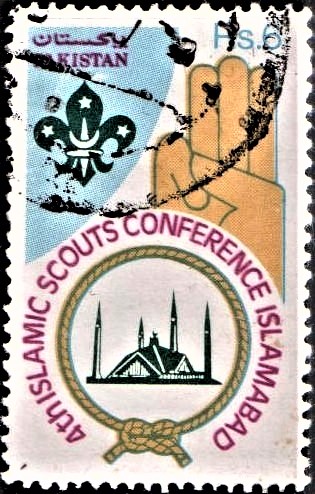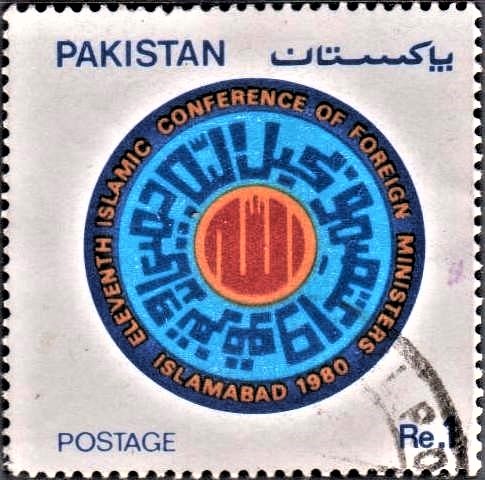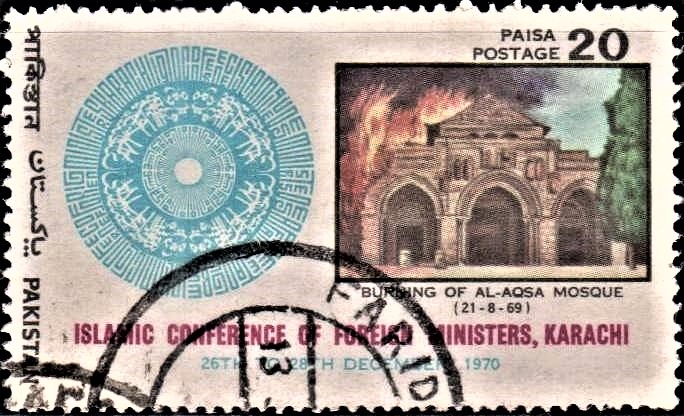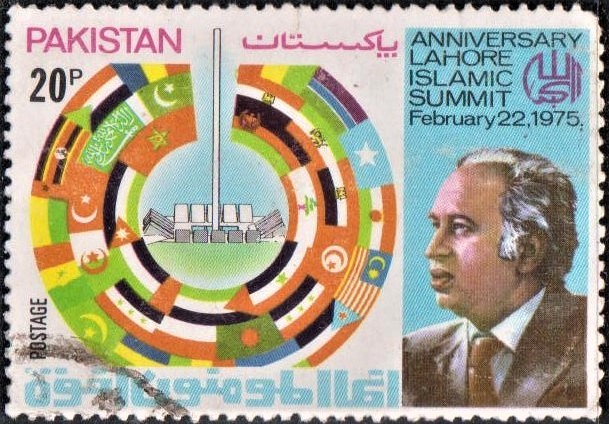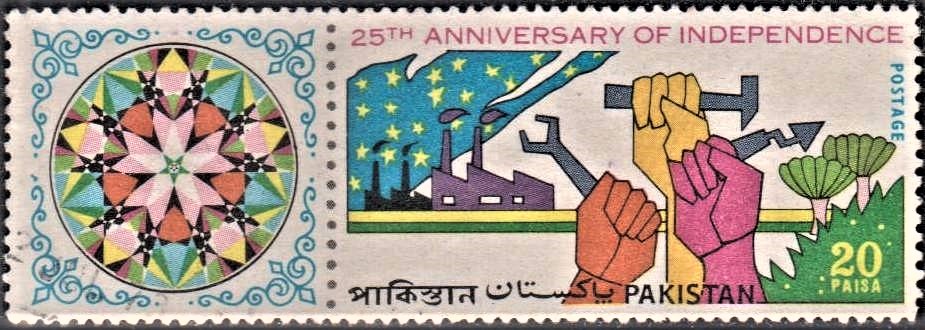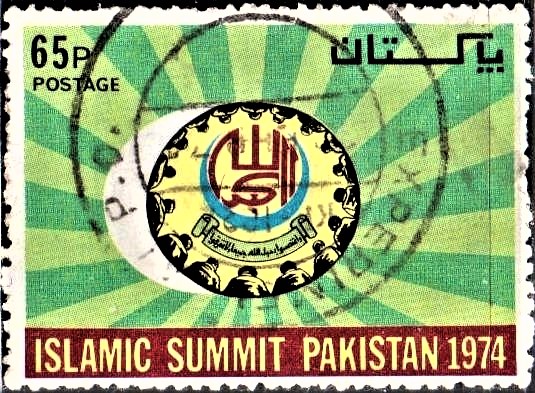
Islamic Summit Pakistan 1974
A set of 2 commemorative postage stamps on the Islamic Summit 1974 :
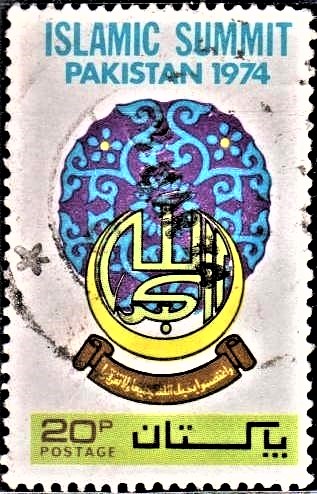
 Issued by Pakistan
Issued by Pakistan
Issued on Feb 22, 1974
Issued for : In order to commemorate the auspicious occasion of the Islamic Summit Pakistan 1974, Post Office Department has brought out a set of two commemorative postage stamps of 20-Paisa and 65-Paisa denominations on 22.2.1974. A Souvenir Sheet containing the two stamps is also to be brought in the size 100 m.m. x 100 m.m. Each souvenir sheet is priced at 85-Paisa. The number of souvenir sheets printed is 1,00,000.
Design :
(i) 20 Paisa Stamp : Format of the stamp is vertical. A circular Islamic Motif in blue and mauve colours appears at the upper portion of the stamp super-imposed on the lower portion by the Islamic Summit insignia in yellow, light green and brown colour.
(ii) 65 Paisa Stamp : Format of the stamp is horizontal. The Islamic Summit insignia which is in red, blue and black colours appears against a circular yellow background fringed by sitting human forms in black symbolic representation of the participants of the Conference. A white Crescent embraces the circular shape from the left side. A number of ray-strips of pale green and dark green colours emerge from behind this circle and spread upto extremities of the stamp.
Type : Stamps, Postal Used
Denomination : 20 & 65 Paisa
Colour :
20 Paisa : Yellow / Blue / Mauve / Black
65 Paisa : Orange / Blue / Red / Black
Size of Stamps :
20 Paisa : 26 x 41 m.m.
65 Paisa : 44.5 x 32.5 m.m.
Size of Print :
20 Paisa : 23 x 38 m.m.
65 Paisa : 41.5 x 29.5 m.m.
Perforation gauge :
20 Paisa : 12½ x 14 (C)
65 Paisa : 13 x 13 (C)
Quantity printed : 7,00,000 each
Number of stamps in each sheet : 50 (fifty) each
Process of printing : Litho Offset
Printers : The Pakistan Security Printing Corporation Ltd., Karachi
About :
- The first Islamic Summit was held in Rabat (Morocco) from 22nd to 25th October, 1969 following the arson in the holy Al-Aqsa Mosque on 21st August, 1969. The sacrilege of the holy Al-Aqsa Mosque caused a tremor in the Muslim world and the deteriorating situation in the Middle East posed a grave danger to the sanctity of the holy places of Islam. The Islamic Heads of the States and Governments were therefore convinced that there was never before a greater need for promoting Islamic solidarity among member states and that their common creed constituted a powerful factor in bringing their people together and fostering understanding, between them. Hence they resolved to promote closer cooperation and mutual assistance in the economic, scientific, cultural and spiritual fields inspired by the immortal teachings of Islam.
- To achieve this end it was decided to hold a Conference of Islamic Foreign Ministers once a year to discuss matters of common interest and make arrangements for common action. A permanent Islamic Secretariat was created to act as liaison between the participating states and to take follow-up action regarding the implementation of decisions taken by the Islamic Conference. The first Islamic Conference of Foreign Ministers was held in Jeddah in March 1970, the second Conference in Karachi in December, 1970, the third one in Jeddah in February/March, 1972 and the fourth Conference of Islamic Foreign Ministers was held in Benghazi in March, 1973. These Conferences took a number of decisions aimed at promoting Islamic solidarity among member States and to consolidate cooperation among them in various fields of activities.
- Following the Arab–Israel War in October, 1973, Tunku Abdul Rahman, the then Secretary-General of the Islamic Secretariat suggested that a Islamic Summit Conference should be convened in Pakistan under the joint sponsorship of Prime Minister, Mr. Zulfikar Ali Bhutto and King Faisal of Saudi Arabia to consider the situation in the Middle East. The Prime Minister of Pakistan, Mr. Zulfikar Ali Bhutto thereupon seized the initiative and offered to host the Summit at Lahore. H. M. King Faisal of Saudi Arabia agreed to co-sponsor the Conference.
- The Middle East was has provided yet another proof that the greatest strength of the Muslim world lies in its unity. The Islamic Summit has accordingly been convened with a view to bringing the weight of the entire Muslim world behind the Arab nations in their just and legitimate struggle and to demonstrate that the cause of the Arabs is the cause of the whole Muslim world. Furthermore important questions such as the future of Jerusalem and other holy places which are of direct concern to every Muslim would be discussed at the Islamic Summit.
- Since its creation, the promotion of Islamic solidarity among the Muslim states has been the cherished goal of Pakistan and a corner stone of her foreign policy. Under the new constitution, it is a constitutional obligation as well. This is why Pakistan played a major role in the crystallisation of the concept of Muslim unity into the concrete shape of the Islamic Conference and the Islamic Secretariat and since the latter’s establishment. Pakistan has been actively participating in all its activities. The holding of the second Islamic Summit at Lahore is further evidence of Pakistan‘s policy of promoting Islamic unity and cooperation among Muslim countries in all fields.
- The Conference is a historic occasion for the Muslims all over the world and Muslim leaders from Morocco to Indonesia will be attending the Conference. It will be the venue for collective deliberations on important matters concerning the Muslims in general and the Middle East and the Baitul Muqaddas in particular. The people of Pakistan have enthusiastically welcomed the Summit which is a privilege for Pakistan to host.


